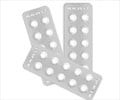Focussed and simple measures can effectively help in managing hypertension in veterans, says a new study.
Focussed and simple measures can effectively help in managing hypertension in veterans, says a new study.
The study was conducted over 53,936 Veteran Affairs (VA) patients for 39 weeks (21 weeks before and 18 weeks after the interventions) during outpatient visits. Of which 63 percent reached their blood pressure goal.The pre intervention analysis showed that 61.8 percent reached their goal whereas post intervention was 64.3 percent.
"Over a four-month period we were able to highlight the importance of blood pressure control with Veteran Affairs Hospital providers and patients and make some small but significant changes," said Dr. Christianne Roumie, M.P.H., lead author of the study and staff physician for the Veterans Affairs Tennessee Valley Healthcare System.
Roumie said hypertension is the most commonly treated chronic condition in VA hospitals, the chief of staff created a performance improvement committee to optimize local hypertension care.
High blood pressure increases the risk of heart attack, angina, stroke, kidney failure, peripheral artery disease (PAD) and the development of fatty deposits in arteries (atherosclerosis).
"For patients to effectively manage a chronic illness, such as hypertension, they need information that’s easy to understand and they need to be involved in the decision-making process," Roumie added.
Advertisement
Distributing treatment guidelines on pocket cards to providers and display posters outlining treatment algorithms and initiating audit/feedback of the provider and firm’s performance.
Advertisement
The study was presented at American Heart Association’s 9th Scientific Forum on Quality of Care and Outcomes Research in Cardiovascular Disease and Stroke.
Source-ANI
SRM/L











